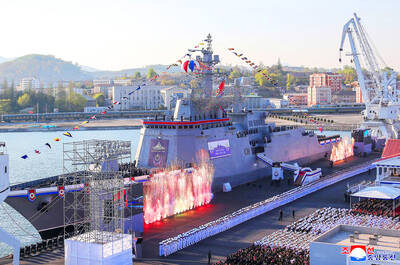Polls opened yesterday in Serbia's key presidential elections seen as crucial for the future of this Balkan state vis-a-vis the EU and as its breakaway province of Kosovo plans to declare independence.
Some 6.7 million voters are to choose among nine candidates a new president for a five-year mandate, but the main race will be between a pro-Western reformer, President Boris Tadic, and ultranationalist Euro-sceptic Tomislav Nikolic.
The outcome could bring Serbia closer to European integration or threaten a return to the status of international pariah as under late nationalist strongman Slobodan Milosevic during the 1990s.
However, latest surveys show none will get a first round majority and Tadic and Nikolic will fight a run-off on Feb. 3, a repeat of the 2004 scenario.
An opinion poll released this week by the Serbian non-governmental group Center For Free Elections and Democracy (CESID) put the Democratic party's Tadic, who wants closer ties to Europe, on 19 percent, and Nikolic, an opponent of NATO and the US whose Serbian Radical Party is the single strongest force in parliament, on 21 percent.
Both Tadic and Nikolic oppose the independence of Kosovo, a breakaway province whose ethnic Albanian majority pledged to separate from Serbia, following failure over almost two years of fruitless negotiations between Belgrade and Pristina over its future status.
The leadership of the province of about 1.9 million people is backed by the US and most of the EU.
Serbia, which considers Kosovo a cradle of its nation and Orthodox Chritian religion, has been supported by Russia in rejecting independence and offering only very wide autonomy within its borders.
Tadic is favored by big Western powers as he is considered best able to resist an expected nationalist surge after a split, which is expected soon after the election.
Amid growing anti-EU sentiment because of its support for Kosovo, Tadic has insisted that Serbia "must continue its European path."
But the EU has conditioned Serbia's integration with arrest and handover of remaining suspects indicted for their role in a series of Balkans bloody war in 1990s, among them top fugitive and former Bosnian Serb military commander Ratko Mladic.
Nikolic, a fierce opponent of the UN war crimes tribunal, has vowed to "do everything to prevent" Kosovo's independence and to strengthen ties with Russia.
Analysts believe turnout levels could play a decisive role. Moderate voters are regarded as less disciplined than nationalist supporters, so strong participation would favor Tadic.
Attention has been focused on Prime Minister Vojislav Kostunica, a conservative, who is backing his infrastructure minister, Velimir Ilic, a nationalist from the New Serbia party, despite being in Tadic's ruling coalition.
Kostunica's choice in the second round could prove decisive, as analysts predict it will be extremely tight.
Polling stations opened at 7am and were to close at 8pm, while preliminary unofficial results were expected overnight yesterday. Final results must be announced by Thursday.
Twenty-three monitors of the Organization for Security and Cooperation in Europe (OSCE) and eight from Russia were monitoring the polls, as well as more than 3,000 CESID observers.
The republic's electoral commission twice voted not to allow monitors from the US and British embassies to observe the polls, despite the Serbian government's recommendation to do so.

Archeologists in Peru on Thursday said they found the 5,000-year-old remains of a noblewoman at the sacred city of Caral, revealing the important role played by women in the oldest center of civilization in the Americas. “What has been discovered corresponds to a woman who apparently had elevated status, an elite woman,” archeologist David Palomino said. The mummy was found in Aspero, a sacred site within the city of Caral that was a garbage dump for more than 30 years until becoming an archeological site in the 1990s. Palomino said the carefully preserved remains, dating to 3,000BC, contained skin, part of the

TRUMP EFFECT: The win capped one of the most dramatic turnarounds in Canadian political history after the Conservatives had led the Liberals by more than 20 points Canadian Prime Minister Mark Carney yesterday pledged to win US President Donald Trump’s trade war after winning Canada’s election and leading his Liberal Party to another term in power. Following a campaign dominated by Trump’s tariffs and annexation threats, Carney promised to chart “a new path forward” in a world “fundamentally changed” by a US that is newly hostile to free trade. “We are over the shock of the American betrayal, but we should never forget the lessons,” said Carney, who led the central banks of Canada and the UK before entering politics earlier this year. “We will win this trade war and

‘BODIES EVERYWHERE’: The incident occurred at a Filipino festival celebrating an anti-colonial leader, with the driver described as a ‘lone suspect’ known to police Canadian police arrested a man on Saturday after a car plowed into a street party in the western Canadian city of Vancouver, killing a number of people. Authorities said the incident happened shortly after 8pm in Vancouver’s Sunset on Fraser neighborhood as members of the Filipino community gathered to celebrate Lapu Lapu Day. The festival, which commemorates a Filipino anti-colonial leader from the 16th century, falls this year on the weekend before Canada’s election. A 30-year-old local man was arrested at the scene, Vancouver police wrote on X. The driver was a “lone suspect” known to police, a police spokesperson told journalists at the

North Korean leader Kim Jong-un has unveiled a new naval destroyer, claiming it as a significant advancement toward his goal of expanding the operational range and preemptive strike capabilities of his nuclear-armed military, state media said yesterday. North Korea’s state-run Korean Central News Agency (KCNA) said Kim attended the launching ceremony for the 5,000-tonne warship on Friday at the western port of Nampo. Kim framed the arms buildup as a response to perceived threats from the US and its allies in Asia, who have been expanding joint military exercises amid rising tensions over the North’s nuclear program. He added that the acquisition